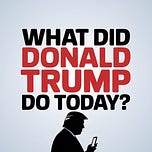The White House released a fact sheet titled “President Donald J. Trump Secures Historic $1.2 Trillion Economic Commitment in Qatar,” which appeared more like a campaign-style document than a credible summary of U.S.–Qatar relations. The headline figure of $1.2 trillion is not substantiated anywhere in the text, lacking any breakdown or clarity on whether it represents binding agreements or speculative projections. Similarly, the claim that over one million American jobs will be supported is misleading, as aircraft orders—like those with Boeing and GE Aerospace—typically unfold over decades, and job numbers may be inflated through indirect or overlapping roles. The document leans heavily on superlatives such as “historic” and “largest-ever,” but provides no historical or comparative context, undermining its seriousness. Particularly concerning is the final section labeled “The Art of the Deal,” which recycles Trump-era slogans like “Made in America” without offering meaningful implementation timelines or policy mechanisms. The fact sheet fails to address critical issues, such as the strategic implications of arms sales to Qatar or human rights concerns associated with Qatari investments. It also repackages long-standing corporate partnerships as Trump administration achievements. Assertions about job creation overlook the realities of modern global supply chains and fail to distinguish between temporary and permanent employment. Overall, the document serves more as political theater than policy reporting, relying on exaggerated claims and partisan tone to promote Trump’s brand rather than presenting a transparent account of economic diplomacy.
Trump’s recent meeting with Syria’s interim president, Ahmad al-Sharaa, in Riyadh marked a significant and controversial shift in U.S. foreign policy. Al-Sharaa, a former jihadist known as Abu Mohammed al-Golani and leader of Hayat Tahrir al-Sham, rose to power after leading the overthrow of Bashar al-Assad’s regime. Trump hailed him as a “tough guy” with a “strong past,” calling him “amazing,” and announced plans to lift U.S. sanctions on Syria—moves that alarmed allies, particularly Israel. The 30-minute meeting included Saudi Crown Prince Mohammed bin Salman and Turkish President Erdoğan (via phone), signaling a broader regional recalibration. Trump claimed that al-Sharaa agreed in principle to expel foreign fighters, take custody of ISIS detainees, and potentially join the Abraham Accords, though Syria has not confirmed these commitments. The talks also referenced an ongoing agreement between Syrian and Kurdish forces to restore Damascus’ control over northeastern oil fields and infrastructure. Celebrations erupted in Damascus following the announcement, with Syrians hopeful about economic recovery and reintegration into the global financial system. Nonetheless, Israeli officials expressed concern about al-Sharaa’s Islamist background, drawing parallels to past attacks like the Hamas assault of October 2023. Trump’s decision to align with Gulf powers while sidelining Israeli objections reveals the shifting geopolitical alliances in the Middle East under his second term and underscores the high-risk nature of legitimizing a former militant leader as a stabilizing force.
During a press gaggle aboard Air Force One, Trump delivered a meandering and chaotic stream of remarks that highlighted persistent flaws in his communication style. The conversation ranged from fighter jet escorts to cryptocurrency, Syria, and Chuck Schumer, often without logical progression. Trump’s praise for al-Sharaa as a “young, attractive guy” with a “very strong past” was tone-deaf, especially given Syria’s turbulent recent history. His comments on sanctions were confusing, using applause as evidence of popular support, and he made vague references to unidentified individuals such as “President Colonel.” He downplayed serious security concerns, casually questioning the need for jet escorts and brushing off threats. Trump’s claims of orchestrating hostage releases lacked detail and appeared self-aggrandizing. When asked about a Trump-branded cryptocurrency allegedly backed by the UAE, he claimed ignorance but used the question to promote AI and crypto as strategic U.S. assets, offering no policy substance. Most troubling was his inflammatory statement accusing Schumer of having “become a Palestinian,” a racially charged comment that exemplified the lack of presidential decorum. Overall, the gaggle lacked professionalism and focus, and reinforced the impression of a president more interested in self-promotion than coherent foreign policy.
In a separate development, Homeland Security Secretary Kristi Noem publicly entertained the suspension of habeas corpus in response to illegal immigration levels, echoing Trump advisor Stephen Miller’s framing of the southern border as an “invasion.” Noem admitted she was not a constitutional lawyer but said she believed immigration levels could justify suspending the right to challenge detention in court. This represents a radical overreach, as the Constitution reserves suspension of habeas corpus for cases of rebellion or invasion—circumstances clearly not met. In fact, illegal border crossings have sharply declined since Trump took office, from 250,000 in December 2023 to just 8,400 in April 2025. The administration’s attempt to pursue such an extreme measure despite these figures indicates a politically motivated effort to erode civil liberties. The Supreme Court has already pushed back, requiring court access for migrants, and legal scholars have warned that combining this with the Alien Enemies Act further undermines due process. Noem’s evasiveness—suggesting the decision rests solely with the president—fits a pattern within the administration of advancing authoritarian policies while dodging accountability. This proposal exemplifies the Trump administration’s willingness to use constitutional loopholes to legitimize sweeping executive powers, threatening the foundational principle of legal redress in the U.S.
In another controversial move, the Trump administration revoked a $16 million federal grant designated for a cybersecurity literacy program in Washington state. The grant was part of the 2021 Digital Equity Act, a bipartisan initiative aimed at closing the digital divide for rural and underserved populations. The administration claimed the program was unconstitutional due to “impermissible racial preferences.” This justification, which mirrors similar cancellations nationwide, was condemned by state officials, including Senator Patty Murray, who argued it would disproportionately hurt marginalized communities. The program had not yet launched but was close to being implemented. While Washington retains a separate $1.2 billion federal broadband grant, officials fear it too may be at risk, especially amid speculation that funds could be redirected to companies like Elon Musk’s Starlink. Legal challenges are expected as states push back against what many view as ideologically driven sabotage of bipartisan infrastructure goals.
Meanwhile, the Environmental Protection Agency announced a rollback of Biden-era limits on certain PFAS chemicals in drinking water. While strict standards for the two most common PFAS—PFOA and PFOS—remain in place at four parts per trillion, limits on three other substances, including GenX, will be withdrawn and reexamined. Utilities have also been granted a two-year extension to comply with the remaining rules. PFAS, often referred to as “forever chemicals,” are linked to severe health problems such as cancer and cardiovascular disease. Environmental advocates and some utilities are expected to sue, either to strengthen the rules or challenge their scope. The rollback aligns with the Trump administration’s broader deregulatory agenda and reflects pressure from industry groups that argued the original rules were expensive and legally overreaching. The decision weakens broader public health protections and signals a retreat from aggressive federal oversight.
Finally, the White House directed federal agencies to suspend all work on the upcoming G20 summit in Johannesburg after Trump accused the South African government of committing “genocide” against white farmers, specifically the Afrikaner minority. Trump said he was reconsidering U.S. participation and characterized the situation as a “terrible thing” ignored by the media. This move follows a February executive order freezing aid to South Africa and a controversial decision to admit 49 Afrikaners as refugees, despite ongoing restrictions on other asylum-seekers. The South African government has firmly rejected Trump’s claims, asserting there is no evidence of genocide and accusing him of spreading disinformation and interfering in sovereign policy. The G20, a forum for economic coordination among major powers, has never before seen U.S. withdrawal over host-nation politics. Trump’s fixation on Afrikaners and white minority grievances in South Africa reflects a troubling racialized narrative and a dramatic break from traditional U.S. diplomatic norms. The administration’s handling of the summit underscores a continued reliance on cultural grievance and unilateralism in foreign policy.













Share this post